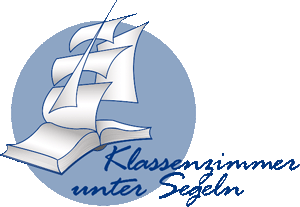 “Ding Dong“- Johannes, the moderator, is striking the bell. “Welcome to our 8th student’s meeting! Today we’ve got a lot to discuss, but first, who is taking notes for the record? Ah, Lena, thank you. Okay, so Ruth asked us to draw up our new division of the watches for the next stage. Besides, we have to decide whether we want to have a mobile-free day or not.“
“Ding Dong“- Johannes, the moderator, is striking the bell. “Welcome to our 8th student’s meeting! Today we’ve got a lot to discuss, but first, who is taking notes for the record? Ah, Lena, thank you. Okay, so Ruth asked us to draw up our new division of the watches for the next stage. Besides, we have to decide whether we want to have a mobile-free day or not.“
This is an example for the beginning of a student’s meeting, that normally takes place each Saturday, after cleaning the ship and the seamen’s tradition “Mizzen sheet on“. During this time, when all the 34 students have to come together, the crew takes over the watch so that every single student is able to participate in the meeting. Those are chaired by our two moderators, who are (re-)elected just before the start of a new stage. The length of this assembly depends on how much there is to discuss, but usually it takes about one and a half hours, which is also the maximum of time we receive to sort out our matters, which again, is depending on the importance of those. This is really variable, sometimes we just have to solve some logistic problems, like for instance, organising the new cabin order or the new watch division. But, of course, these are not the only topics we discuss: as we all live on a ship, where there is not a lot of space for this amount of people, it is quite normal that sometimes, there are little conflicts between the students themselves or between students and crew members. If a similar thing happens, the student’s meeting is one of the best opportunities to solve it together with the other pupils and to decide on concrete steps to help the situation improve. In the last 5 months we fortunately didn’t have a lot of great conflicts.Of course, there were some little arguments, but we managed to settle those quickly. For us, these meetings were also a way of organising and planning something like a joint action, such as going together to a café for an evening like we did on the Acores. As already mentioned, on certain land excursions we could independently decide to spend a day without our mobile phones. The purpose of these days, when all mobile phones would be collected, is to avoid distraction from social media and to have the full attention on our common journey. This we carried out for example in Falmouth, our first stay which is also going to be our last one, in Panama (Boquete) and recently, in our last student’s meeting, after some really controverse discussions, we decided to carry it out again in Falmouth, where we’re going to arrive in about one week.
Our meetings can be very democratic, sometimes even a bit too democratic, being the reason of the discontent of some pupils. At this point it is necessary to mention that after 5 months, it is really understandable to be tired of all our votings, especially when we start to vote on if we want to vote on the voting on a certain issue. Once, our meeting escalated a bit after having discussed half an hour about the colour of a bracelet. It ended in a chaos of annoyed students and everybody was happy when we finally finished our assembly.
Nevertheless, the student’s meetings we have are both important as well as necessary, especially because it’s the only time all 34 students come together, a circumstance that, in our daily life on board, is mostly impossible because there are always some who have sentry duty. And as most of the matters we discuss are important for everybody, this is our only possibility to settle such matters. In all our student’s meetings, I think we have learned quite a lot about assemblies, how to discuss and how to come to solutions without wasting time. But what we’ve definitely learned during this time is what is the right degree of democracy in such a meeting, so that we will never ever vote on votings again.
Sie befinden sich auf der KUS Archiv-Seite. Hier geht es zur aktuellen Website.
